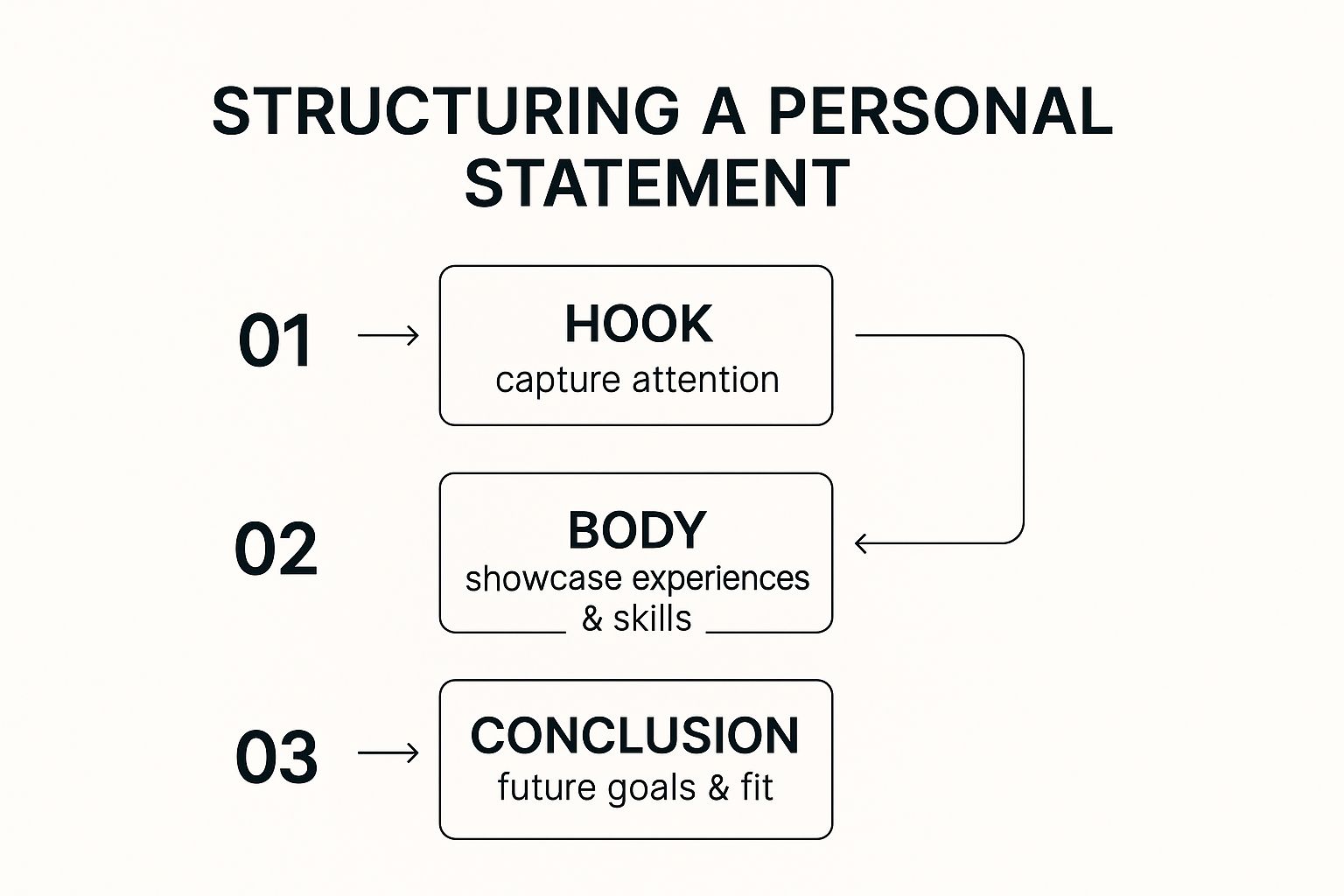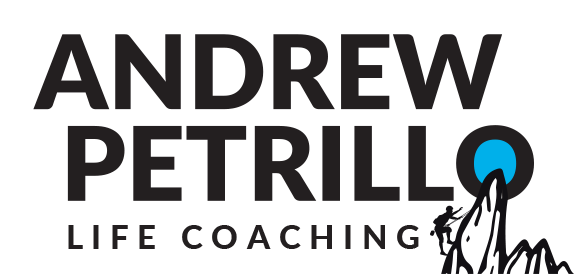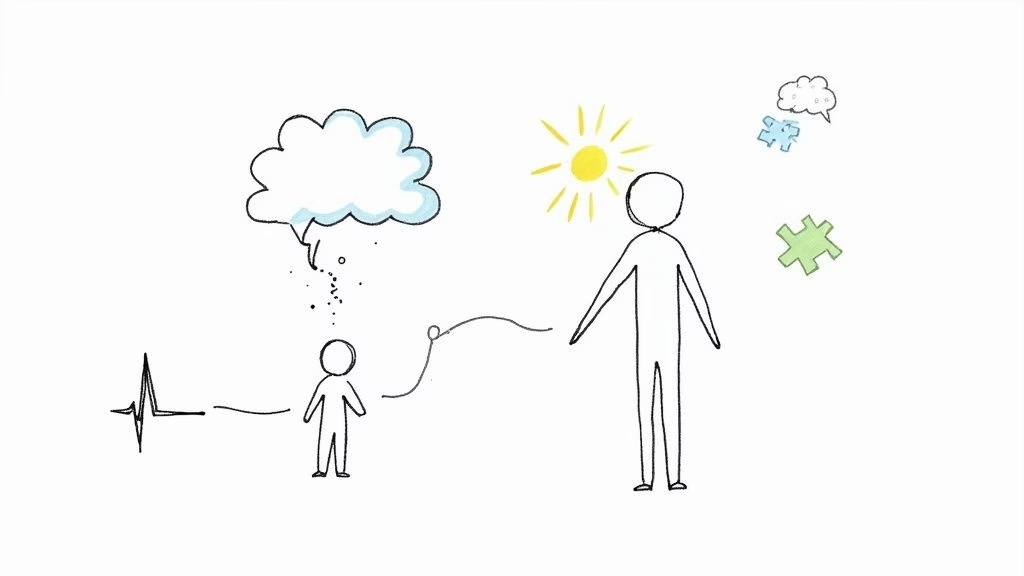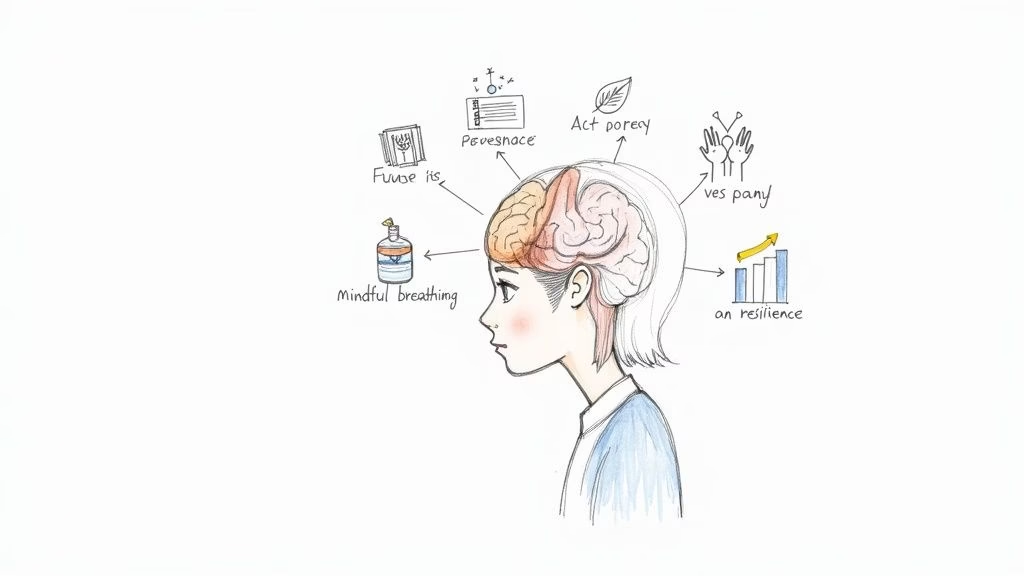Writing a personal statement isn’t just about listing achievements; it’s about telling a real, compelling story. It’s your chance to show an admissions committee who you are beyond the grades and test scores. The whole process starts with some serious self-reflection to find an angle that’s uniquely yours, then structuring that story so every single word pulls its weight.
Laying the Foundation for a Powerful Personal Statement

The personal statement can feel like a massive, high-stakes assignment. I get it. For a lot of teens, it’s the first time they’ve ever been asked to look this deeply at their own lives and experiences. That kind of pressure can make anyone want to procrastinate, turning a blank page into your worst enemy.
But once you understand the why behind this essay, the whole game changes. Think about it: admissions officers are sifting through thousands of applications. They’ve already seen the transcripts. They know the test scores. What they’re really searching for is the human being behind all that data. This essay is your one shot to let your voice shine, show your resilience, and prove you’re more than just a number.
The Parent’s Role: Guide, Not Ghostwriter
For parents, your job is to be a supportive guide, not the one holding the pen. The stress of college applications is real, and it’s easy for a teen’s motivation to dip. One of the best things you can do is create a low-pressure zone for brainstorming. This is a critical parenting tip: your calm presence can reduce their anxiety significantly.
Instead of hitting them with, “So, what are you going to write about?” try asking more open-ended questions. Things like, “What’s a project you worked on that made you feel really proud?” or “Tell me about a time you had to solve a super tricky problem.” This helps them tap into meaningful memories without the immediate stress of finding that “perfect” topic.
This is also a critical time to keep an eye on their mental health. The application process is a marathon, not a sprint, and burnout is a very real thing.
A supportive environment is everything. The goal isn’t to pile on more pressure. It’s to create a space where your teen feels confident enough to explore their own stories without worrying about being judged. This transforms a scary task into a manageable journey of self-discovery.
Before your teen even starts writing, it helps to understand what makes a personal statement truly connect with a reader. It’s not about having the most dramatic story, but about how you tell it.
Here’s a quick breakdown of the core components that make an essay memorable.
Anatomy of a Powerful Personal Statement
| Component | What It Achieves | Quick Tip |
|---|---|---|
| A Compelling Hook | Grabs the reader’s attention immediately and makes them want to keep reading. | Start in the middle of the action or with a surprising statement. Avoid clichés. |
| Authentic Voice | Reveals your personality, character, and unique perspective. | Write like you speak (but polished). Let your genuine curiosity and passion come through. |
| Clear Narrative Arc | Tells a concise story with a beginning, middle, and end, showing growth or change. | Focus on one central theme or moment. Don’t try to cram your entire life story in. |
| Vivid Detail & Imagery | “Shows” instead of “tells” by using sensory details to bring your story to life. | Instead of saying you were determined, describe the challenge you pushed through. |
| Meaningful Reflection | Connects your story back to your goals, values, and what you’ll bring to the college. | Answer the “so what?” question. Why does this story matter? What did you learn? |
Thinking about these elements from the start can provide a solid framework and make the entire writing process feel much more approachable.
Tackling Procrastination and Supporting Mental Wellness
Procrastination usually isn’t about laziness—it’s often an emotional response to stress. For teens facing the pressure of school and applications, it’s a sign of feeling completely overwhelmed. The best way to fight it is by breaking the essay down into tiny, manageable chunks. Seriously, set a timer for 15 minutes and just jot down memories or ideas. No sentences required. No pressure.
It’s also crucial to recognize the signs of anxiety. Research from the American Psychological Association shows teens report stress levels similar to adults, especially during the school year. If your teen is really stuck and struggling to even start, it might be time to bring in some outside resources for mental health.
- The Jed Foundation: This organization is fantastic. They offer tons of resources specifically for teen mental health, with practical tips on how to manage stress and anxiety.
- Child Mind Institute: Here you can find excellent guides for both parents and teens, covering everything from staying motivated in school to dealing with procrastination head-on.
When you frame the personal statement as an opportunity for reflection instead of a test to be passed, you help shift the entire conversation from one of stress to one of empowerment.
Finding Your Story and Beating the Blank Page

The blank page is intimidating. I get it. For a lot of students, this is the first time you’ve been asked to write something so personal, and the pressure to find that one “perfect” story often leads to the same thing: putting it off. It’s a completely normal response to feeling overwhelmed.
This phase is tough on parents, too. You watch your teen wrestling with anxiety and a motivation level that seems to have flatlined. The whole college application process feels like a marathon, and the personal statement can feel like a huge wall right at the start.
The key is to reframe this whole thing. It’s not a high-stakes test. It’s an opportunity for self-discovery. A great personal statement needs great ingredients—real memories, genuine reflections. Without those, you’re just staring at an empty pantry.
A Parent’s Guide to Fostering Discovery
Parents, your role here is more important than you think. You can be an amazing brainstorming partner by creating a supportive, low-pressure space for your teen to think. Your job is to ask questions that spark memories, not demand answers. This parenting tip is crucial: focus on fostering conversation, not directing content.
Instead of asking, “So, what life-changing event are you going to write about?” try a softer approach. Open-ended questions can unlock stories your teen has probably forgotten or dismissed.
- “Tell me about a time you were working on something and just completely lost track of the hours. What was that like?”
- “What’s the hardest problem you’ve ever had to figure out, even if it seems small now?”
- “When did you feel proudest of how you handled a tough situation all by yourself?”
These questions aren’t digging for drama. They’re about uncovering moments that show character, resilience, and passion. Just listen and encourage. This should feel like a conversation, not an interrogation.
The most powerful personal statements often come from seemingly ordinary moments. It’s the reflection on that moment—what you learned, how you changed—that makes the story extraordinary.
Tackling Motivation and Procrastination Head-On
For students, that “stuck” feeling is usually a symptom of anxiety, not laziness. When a task feels massive, our brains tend to hit the emergency brake. This is a common struggle with school motivation and procrastination. The best way to break that cycle? Make the task smaller.
Forget about writing an entire essay for now. Your only goal is to get some ideas on paper. You can start with just 15 minutes. Seriously. Set a timer and try one of these low-stakes brainstorming methods.
Brainstorming Techniques to Uncover Your Story
- The Object List: Walk around your room and list ten things that actually mean something to you. A beat-up concert t-shirt, a trophy from middle school, a gift from a friend. Next to each one, just write one sentence about the memory attached to it.
- The “I Know” List: Make a list of things you know how to do really well. It can be anything—baking the perfect cookie, debugging code, calming down a nervous friend. Every skill has a story behind how you learned it.
- The Failure Résumé: We’re always told to highlight our wins, but our mistakes are where the real learning happens. List a few times you tried something and it didn’t work out. What did you learn? What did you do differently next time?
These exercises are designed to take the pressure off. You’re just gathering raw materials. So many great essays started with a simple memory that popped up during a quick, no-judgment brainstorm.
Prioritizing Mental Health During a Stressful Time
Let’s be real: the pressure of college applications can take a huge toll on a teen’s mental health. Research consistently shows that academic pressure is a major source of stress for adolescents. This kind of stress can crank up anxiety and tank motivation.
It’s so important for both parents and students to recognize the signs of burnout and actively manage that stress. This isn’t just about getting an essay done; it’s about getting through this major life transition in a healthy way.
Resources for Teen Mental Wellness
- The Child Mind Institute: An incredible resource with practical advice for parents and teens on handling school-related stress and beating procrastination.
- The Jed Foundation (JED): This nonprofit offers toolkits and resources to help teens and young adults navigate emotional challenges, build resilience, and manage anxiety.
If motivation is still a major hurdle, it might be time to try some different strategies. Learning how to find motivation when you feel completely stuck is a life skill that goes way beyond this one essay. Building a healthier relationship with big projects starts with small, consistent steps. When you prioritize well-being, the journey of writing a personal statement can actually become an empowering one.
Weaving Your Story for Maximum Impact
Okay, so the brainstorming whirlwind is over. You’re probably staring at a collection of memories, random thoughts, and half-formed ideas. Now comes the real work: shaping that raw material into a story an admissions officer will actually remember.
A great personal statement isn’t just a laundry list of your achievements. It’s a story. It needs a clear beginning, a compelling middle, and an ending that ties everything together and shows who you are. You have to think like a storyteller.
Your goal is to pull the reader in with a great hook, build on it to show how you’ve grown, and leave them with a final thought that sticks. Every single part has to work together.
This visual guide breaks down that flow, from grabbing their attention to making a lasting impression.

As you can see, each piece of the essay has a specific job. It’s all about guiding the reader through your journey of growth in a way that makes sense and feels authentic.
Crafting an Unforgettable Opening Hook
Your first sentence is the most valuable real estate you have. Seriously. Admissions officers read hundreds, if not thousands, of these essays. You get a few seconds to make them care. A good hook yanks them right into your world and makes them want to know what happens next.
One of the best ways to do this? Start in the middle of the action.
Instead of saying, “I learned teamwork from my robotics club,” try something like, “The smell of burnt wires filled the workshop, and the competition was only hours away.” See the difference? That second one creates instant curiosity and drops the reader right into a scene.
The point isn’t just to be dramatic for the sake of it. Your hook has to feel genuine and connect directly to the main theme of your essay. It’s setting the stage for the bigger story you’re about to tell.
Developing the Body of Your Essay
This is where you connect the dots. The body of your essay is where your experiences link up with your character, your skills, and what you want to do in the future. This is not the place to just list stuff you did. Pick one meaningful story—a single anecdote—that really shows a key part of who you are.
A report from Kaplan Test Prep found that a strong personal statement can improve an applicant’s odds of getting in by up to 50%. That’s huge. It shows why telling one powerful story is so much more effective than just listing accomplishments.
The trick is to “show, don’t tell.” It’s a classic for a reason.
- Don’t just tell them: “I am a resilient person.”
- Show them: Describe a specific time you hit a wall, what that felt like, and the exact steps you took to push through it.
This is what makes your personality feel real on the page. You can find more advice on this with our college application essay tips. The body of your essay should be all about how a single experience changed your perspective or clarified your goals.
A Parent’s Role in Shaping the Narrative
Parents, this one’s for you. Your job here is to be a sounding board, not a co-writer. The pressure of structuring this essay can make any teen procrastinate, especially when they feel stuck. A key parenting tip is to help them break down the task. You can help by asking the right questions—questions that guide them without giving them the answers.
If your teen is struggling to find the bigger theme in their story, try asking things like:
- “What was the most important thing you learned from that?”
- “How did that moment change the way you see things now?”
- “What does this story say about the kind of person you are?”
These kinds of questions push them to think a little deeper and find the “so what?” of their own story. The whole point is to keep their voice authentic while helping them see the connections they might be missing.
Your job is to help them organize their thoughts, not to organize their thoughts for them. A simple conversation can often untangle a narrative knot that has been causing stress and procrastination for days.
Writing a Conclusion That Sticks
Your conclusion has to do more than just repeat what you already said. This is your last chance to drive your main point home and connect your past experiences to your future goals. A great conclusion brings your story full circle.
It should answer the unasked question: “Why did you tell me this story?” Connect the lesson from your anecdote to why you’re a great fit for the specific college or program you’re applying to.
For example, if your essay was about building a community garden, your conclusion could talk about your desire to contribute to a collaborative campus community. This creates a memorable, forward-looking ending that leaves the admissions officer with a clear picture of who you are and what you’ll bring to the table.
Finding Your Voice and Making It Count
You’ve got the structure down. Now for the hard part: breathing life into it. This is where you move beyond an outline of events and start telling a story that could only come from you. The trick is to find a voice that’s authentic—professional enough for an admissions committee, but personal enough that they feel like they’ve actually met you.
Your voice is just the personality that shines through your words. Are you funny? Deeply curious? Analytical? Let that come out. So many applicants fall into the trap of trying to sound like the “perfect student,” cramming their essays with academic jargon and thesaurus-fueled vocabulary. Don’t do it. Admissions officers read thousands of these things; they can spot a phony a mile away. They want to hear from a real person, not a walking dictionary.
Show, Don’t Just Tell
If there’s one piece of advice that will completely change your essay, it’s this: show, don’t tell. It’s the most powerful way to make your story stick. Instead of just listing your qualities, you use specific details, actions, and scenes to prove them. This lets the reader connect the dots on their own, which is far more impactful.
Anyone can write, “I’m a hardworking person.” It’s a throwaway line. But describing the feeling of staring down a calculus problem at 2 a.m., with crumpled-up pages of failed attempts surrounding you? That shows your grit without you ever needing to say the word.
Here’s what that looks like in practice:
- Telling: “I am a very determined person who enjoys challenges.”
- Showing: “The code refused to compile, spitting out the same error for the tenth time. I didn’t quit. Instead, I brewed another cup of tea, wiped my whiteboard clean, and started mapping the entire logic flow from scratch. I was going to find that single misplaced semicolon.”
See the difference? The second example is an actual story. It’s engaging and gives them concrete proof of who you are.
Every Single Word Matters
You don’t have a lot of time to grab their attention. A Kaplan Test Prep survey found that 40% of admissions officers spend five minutes or less reading a personal statement. Only 12% spend more than 15 minutes. That means your writing has to be tight, powerful, and concise.
Every sentence has to earn its spot on the page.
When you edit, be ruthless. If a word, a phrase, or even a full sentence doesn’t add something meaningful or push the story forward, cut it. Your goal isn’t to hit a word count; it’s to make an impact.
This is where procrastination can really bite. The pressure to write something brilliant right out of the gate is paralyzing for a lot of teens. The best parenting tip? Encourage a “brain dump” first draft. Just get it all on the page, no matter how messy. The polishing comes later.
A Parent’s Role: Editor, Not Ghostwriter
Parents, this is where you come in—as a supportive guide, not a co-author. It’s so tempting to jump in and “fix” your teen’s writing, but rewriting their sentences strips away their voice. Trust me, admissions committees can spot an adult-written essay instantly. It’s a huge red flag.
Your teen is under a mountain of pressure right now. This essay is just one more source of stress. Your job is to be a sounding board, not another critic. Help protect their mental health through this process.
How You Can Actually Help:
- Ask guiding questions. Instead of rewriting a clunky sentence, ask, “What were you trying to say here?” or “Can you think of a specific time that shows this quality?”
- Listen for their real voice. Read it aloud. Does it sound like your kid when they’re excited about something? If it sounds stiff and formal, gently point it out.
- Be a fresh pair of eyes. You can help spot things they’ve missed, like confusing sentences or ideas that don’t quite connect.
If procrastination is turning into a real battle, it might be a symptom of deeper stress or anxiety. The college process can drain any student’s motivation. Creating a low-pressure environment at home is the best thing you can do to help them find their voice. For extra support, organizations like The Jed Foundation and the Child Mind Institute have fantastic resources for helping teens (and parents) manage school-related stress.
Refining Your Draft With Editing and Feedback

Let’s be honest: your first draft is a huge accomplishment. But it’s also just the raw clay. The real art happens in the revision process, where a good story gets molded into a great one. This isn’t just about catching typos; it’s about sharpening your ideas, clarifying your message, and letting your authentic voice come through.
Too many students get attached to that first version, but you have to be willing to see it as a starting point. In my experience, a truly compelling personal statement goes through three to seven drafts. The first few are for big, messy changes—rearranging entire paragraphs, finding your rhythm. Later drafts are for polishing individual sentences and finding the perfect word.
Don’t be afraid to make big cuts. It’s all part of the process. This phase is where the pressure really kicks in, and it’s easy to start procrastinating. The trick is to tackle it systematically instead of trying to fix everything at once.
Self-Editing for Impact and Clarity
Before you hand your essay over to anyone, be your own toughest critic. Seriously, step away from the draft for a day or two. When you come back, you’ll have the fresh perspective you need to spot awkward phrasing or confusing ideas that you were blind to before.
When you’re ready, read your entire essay out loud.
This is the single most effective editing trick I know. If a sentence makes you stumble or just feels weird to say, a reader will feel it, too. It’s the fastest way to find clunky transitions and sentences that sound like you’re trying way too hard to be academic.
A Quick Self-Editing Checklist:
- Does the first paragraph grab you? Is your hook strong enough to make someone want to keep reading?
- Is your main theme obvious? Can a stranger easily tell what quality or story you’re trying to highlight?
- Does it actually sound like you? Ditch the clichés and jargon. Use your real voice.
- Is every single sentence doing a job? Be ruthless here. If a sentence doesn’t add value or move the story forward, cut it.
A Parent’s Guide to Constructive Feedback
Parents, this is a delicate dance. Your job is to be a supportive guide, not a co-author. It’s so tempting to rewrite sentences to make them “better,” but that can easily erase the very thing admissions officers want to see: your teen’s authentic voice. The goal is to offer helpful feedback without taking over.
Instead of grabbing a red pen, try asking questions. If a section is confusing, ask something like, “What were you hoping to get across in this paragraph?” This prompts them to clarify their own thinking. This approach also helps manage the incredible stress that leads to procrastination and burnout during application season.
Your feedback should empower your teen to make their own revisions. The best comment you can give is one that sparks their own idea for improvement, preserving their ownership of the final product.
The college application journey is an emotional marathon. Remember that a fear of criticism can completely sap a student’s motivation and drive procrastination. For more on this, the Child Mind Institute offers fantastic resources for parents on how to help teens manage school-related stress.
Getting a Fresh Set of Eyes
Once you’ve done your own pass, it’s time to bring in fresh eyes. But choose your readers wisely. A teacher who knows you well, a school counselor, or a trusted mentor are all solid choices. Ask them to check for clarity, flow, and overall impact—not just grammar.
When you get their notes, remember that feedback is a suggestion, not a command. You don’t have to accept every single change. Listen with an open mind, but ultimately, you get to decide what advice will genuinely strengthen your story.
If you’re thinking about how to frame challenges you’ve faced, you might get some ideas from our article about.
It’s also worth noting that AI writing tools are becoming more common for academic support. While they can be great for a final grammar check, never let them replace your own thoughts and voice. Your personal statement needs to be just that—personal.
Common Personal Statement Questions
Writing a personal statement brings up a lot of questions. It’s totally normal to hit a wall as you move from a messy brainstorm to a final draft. This isn’t just some school assignment; it’s a deeply personal process that can be draining for students and parents alike.
Let’s walk through some of the most common questions we hear. My goal is to give you clear answers so your family can navigate this journey with more confidence and less stress. It’s all about making choices that honor your teen’s real voice and story.
Can I Write About a Sensitive Topic?
Yes, but you have to handle it with care. Writing about a tough or traumatic experience can be incredibly powerful, but the essay’s focus has to be on growth, resilience, and what you learned. The point isn’t to dwell on the hardship itself, but to show how you came out of it a stronger, more self-aware person.
Think of it as a story of transformation, not victimhood. Admissions officers are looking for maturity and the ability to reflect on life’s challenges in a constructive way. Before you commit, ask yourself if you’re truly comfortable sharing this story with a group of strangers. The tone has to be one of insight, not pain.
Your story should showcase you as a proactive individual who has overcome obstacles, not as someone defined by them. The true power lies in the reflection and personal growth that followed the event.
How Can I Stand Out Without a Dramatic Story?
You absolutely do not need a life-altering, dramatic event to write a standout essay. I promise. Authenticity and genuine insight are way more impactful than manufactured drama. Admissions committees are far more interested in seeing how you find meaning in your experiences, no matter how “ordinary” they might seem.
Zoom in on the small, specific moments that say something important about who you are.
- A passion that keeps you up at night, like perfecting a family recipe or coding a simple app.
- A time you totally struggled with a school project and had to get creative to solve it.
- A single conversation that shifted your perspective on something you thought you knew for sure.
Your unique point of view is what makes you memorable. How you think, connect ideas, and what you’re curious about—those are the things that will make your essay shine. It’s all about the depth of your reflection, not the drama of your topic.
What Is a Parent’s Role in This Process?
Parents, your role is to be a supportive guide, not the writer or editor-in-chief. This whole process is incredibly stressful for teens, which often leads to procrastination fueled by a nasty mix of anxiety and self-doubt. Your main job is to create an encouraging, low-pressure environment.
Help your teen brainstorm by asking open-ended questions about their interests or proudest moments. Just be a sounding board, listening to their ideas without jumping in to judge them. When they ask for feedback, focus on clarity. Ask things like, “Does this story really capture what you love about this?” or “When I read this, does it sound like you?”
Resist the urge to rewrite their sentences or nudge them toward a different message. The essay must be in their authentic voice. Honestly, one of the most valuable parenting tips for this stage is just helping them manage the stress of it all.
Supporting Your Teen’s Mental Health and Motivation
The pressure of writing a personal statement can really take a toll. Procrastination is often a symptom of feeling completely overwhelmed, not a sign of laziness. Research shows that teens today are dealing with stress levels that are significantly higher than what’s considered healthy.
If your teen is struggling to get started or stay motivated with school work, here are a couple of great resources for teen mental health:
- The Jed Foundation (JED): They offer fantastic toolkits and articles for teens who are navigating emotional challenges and trying to build resilience during stressful times like this.
- The Child Mind Institute: This site has practical guides for both parents and teens on managing school-related anxiety and finding ways to overcome procrastination.
Encourage breaks. Stick to routines. And please, remind them that their worth is not tied to a single application. When you prioritize their mental well-being, you’re helping them build the sustainable motivation they need to get this done with confidence.
At Andrew Petrillo Life Coaching, we specialize in helping teens and young adults navigate these exact challenges. If your student is struggling with motivation, procrastination, or the stress of college planning, our personalized coaching can provide the practical strategies and support they need to succeed. Learn how we empower teens to turn overwhelm into action by visiting https://andrewpetrillolifecoaching.com.




















